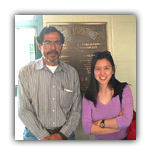 |





Farmworker
|
 |

We Love You, We Hate You

Do you ever sit down to eat a ripe, delicious orange, and stop to wonder where the fruit comes from? Lately, I've been learning a lot about Mexican-Americans working on the farms that grow our fruits and vegetables. I wonder about the unknown person who picked the orange I'm about to eat.
During the Depression, Mexicans living and working in the US were not treated well. They were looked at as taking jobs away from US-born Americans. But when World War II began, many Americans entered the military and factories. More jobs on farms and in fields opened up. Many people were brought from Mexico, to labor in American fields.
During the Depression, many farms were run more like big corporations than small family businesses. People who looked out for the rights of laborers were worried about the way that the big farms treated the farm workers. The growers liked the idea of cheap labor from Mexico, and they decided to lobby Congress for the right to bring these workers, called 'braceros', into the country. The labor leaders were worried about the rights of these workers (especially since they knew that the growers had not treated the American workers well, either).
In the meantime, Mexico was struggling with problems of unemployment, poverty and overpopulation. The Mexican government signed an international agreement putting into place the bracero program.
Mexico tried to negotiate better safeguards and protection for the braceros. The agreement pledged that workers would not be used to displace American workers or to lower wages. It also promised safe and reasonable working conditions and wages. Braceros would work for one year usually and then go back to Mexico. Transportation was to be provided both ways, along with adequate housing and health services. Mexico did not anticipate the political power of US growers who were prepared to break all the rules and did.

|
 |
I arrived in El Paso, Texas, a major hub for braceros back in the day, hoping to talk with Carlos Marentes. Carlos founded a group called Sin Fronteras (Without Borders), a community organization that works with farm workers. He's excited by The Odyssey's mission to tell some of the forgotten stories in America. "No one talks about the braceros," he tells me. "Their contributions are never acknowledged." His center has started a Bracero Project that will tell the story of the braceros. Though many have died, some are still working in the fields.

|
 |
Carlos showed me an original contract signed by a bracero. He tells me a little bit about their lives. Most braceros couldn't read English and did not really know what was in the contract. This led to lots of abuses. Some employers would cheat the workers on the hours they worked. They also made very little money to begin with. Then, they had to pay for housing and food, so they often only had $10 to send back to their families in Mexico.
|
|

Ah yeah, Austin here we come!
|
|
Another problem came out of the bracero program. The program was supposed to stop the problem of illegal immigration. However, since so many Mexican people heard about the wonderful wages promised in America, many workers came over without a contract. Americans became paranoid about the illegal immigrants. In 1954, the US began to search for, and deport, these Mexicans. The US wanted the cheap labor that came with the bracero program, but it did not want the other immigrants who were looking for work.
But in 1956, the Civil Rights movement was growing, and the US was thinking about the many oppressed groups of people. Then, in 1963, 32 braceros died in a truck accident. The bracero program ended in the following year.
This year, Congress is thinking about bringing back the bracero program as a way to combat illegal immigration. That's why Carlos is so passionate about the Bracero Project. He believes that we must have more humane policies towards farm workers. But first, we must learn from the past that we've so far ignored. Most of all, he wants people to recognize the enormous contribution the braceros made in feeding our population. When he hears teachers tell Mexican children, "Watch out or you'll end up in the fields like your parents," it saddens him. "How can we fight for better wages and conditions if we don't find value in what we do?" he asked. "Our movement is about dignity ultimately, to give workers dignity and pride in the service they are providing to our country." As I munch on the last bit of my orange, I silently give thanks to the hard work of those who have and those who continue to toil in the fields on behalf of all of us who need to eat.
Irene
Please email me at:
irene@ustrek.org
Links to Other Dispatches
Stephen - Heeeeehhhhhhh. Hop on the chopper and cruise through suburban paradise
Jennifer - You ain't nothing but a SUPERSTAR!!!!!!!
|



